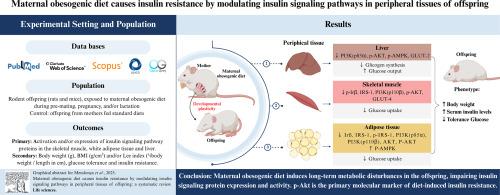Maternal obesogenic diet causes insulin resistance by modulating insulin signaling pathways in peripheral tissues of offspring: a systematic review
IF 5.1
2区 医学
Q1 MEDICINE, RESEARCH & EXPERIMENTAL
引用次数: 0
Abstract
Overweight and obesity during critical periods, gestation and/or lactation, can harm offspring metabolic health. Maternal obesogenic diets may program offspring long-term, impairing physiology and increasing risk for insulin resistance. A key mechanism is the reduced expression/activity of insulin signaling proteins in peripheral glucose-metabolizing tissues. This systematic review examined the impact of maternal obesogenic diets on insulin resistance in the offspring of rats, through modulation of insulin signaling proteins in skeletal muscle, liver, and white adipose tissue. Searches in LILACS, PubMed, Web of Science, Scopus, and Sigle via Opera Gray yielded 2212 studies; 43 met inclusion criteria, following a PROSPERO-registered protocol. Findings showed reduced expression and activity of IRS-1, PI3K, AKT and GLUTs in peripheral tissues, alongside increased body weight, glucose intolerance, and insulin resistance. Thus, maternal obesogenic diets impair insulin signaling and related metabolic outcomes in offspring.

母体致肥性饮食通过调节后代外周组织中的胰岛素信号通路引起胰岛素抵抗:一项系统综述
孕期和/或哺乳期的超重和肥胖会损害后代的代谢健康。母体致肥性饮食可能对后代进行长期编程,损害生理机能并增加胰岛素抵抗的风险。一个关键的机制是外周葡萄糖代谢组织中胰岛素信号蛋白的表达/活性降低。本系统综述通过调节骨骼肌、肝脏和白色脂肪组织中的胰岛素信号蛋白,研究了母体致肥性饮食对大鼠后代胰岛素抵抗的影响。在LILACS、PubMed、Web of Science、Scopus和single via Opera Gray中检索得到2212项研究;43例符合纳入标准,遵循普洛斯佩罗注册协议。研究结果显示外周组织中IRS-1、PI3K、AKT和GLUTs的表达和活性降低,同时体重增加、葡萄糖耐受不良和胰岛素抵抗。因此,母体致肥性饮食会损害后代的胰岛素信号和相关代谢结果。
本文章由计算机程序翻译,如有差异,请以英文原文为准。
求助全文
约1分钟内获得全文
求助全文
来源期刊

Life sciences
医学-药学
CiteScore
12.20
自引率
1.60%
发文量
841
审稿时长
6 months
期刊介绍:
Life Sciences is an international journal publishing articles that emphasize the molecular, cellular, and functional basis of therapy. The journal emphasizes the understanding of mechanism that is relevant to all aspects of human disease and translation to patients. All articles are rigorously reviewed.
The Journal favors publication of full-length papers where modern scientific technologies are used to explain molecular, cellular and physiological mechanisms. Articles that merely report observations are rarely accepted. Recommendations from the Declaration of Helsinki or NIH guidelines for care and use of laboratory animals must be adhered to. Articles should be written at a level accessible to readers who are non-specialists in the topic of the article themselves, but who are interested in the research. The Journal welcomes reviews on topics of wide interest to investigators in the life sciences. We particularly encourage submission of brief, focused reviews containing high-quality artwork and require the use of mechanistic summary diagrams.
 求助内容:
求助内容: 应助结果提醒方式:
应助结果提醒方式:


